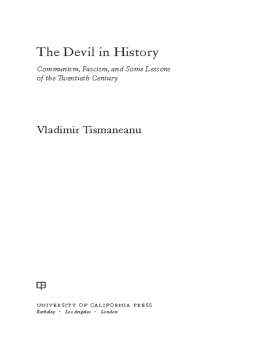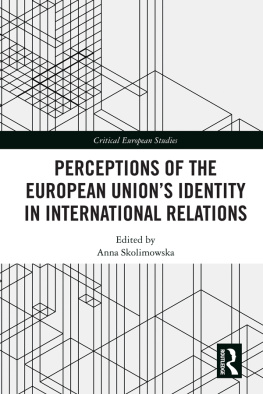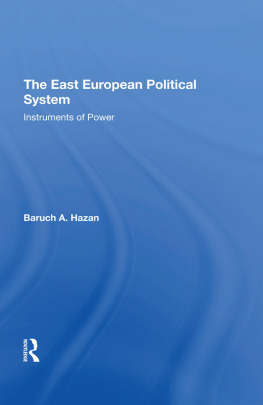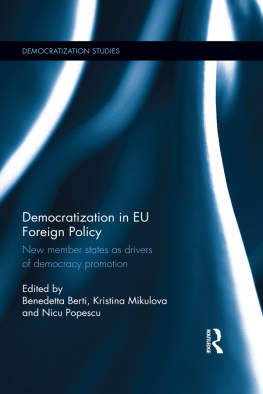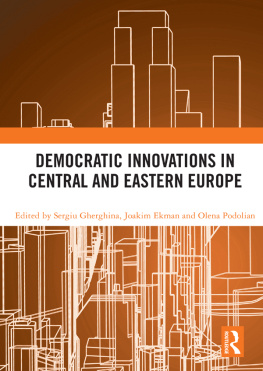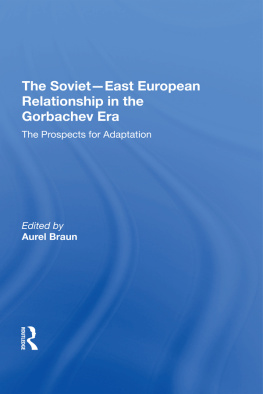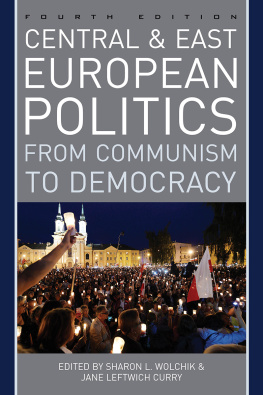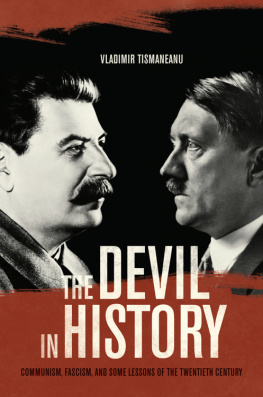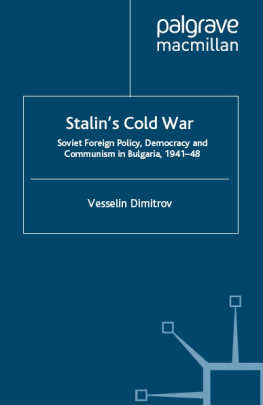REINVENTING POLITICS
REINVENTING POLITICS
Eastern Europe from Stalin to Havel

Vladimir Tismaneanu

THE FREE PRESS
NEW YORK OXFORD SINGAPORE SYDNEY
A Division of Macmillan, Inc.
NEW YORK
Maxwell Macmillan Canada
TORONTO
Maxwell Macmillan International
NEW YORK OXFORD SINGAPORE SYDNEY
The Free Press
A Division of Simon & Schuster
1230 Avenue of the Americas
New York, NY 10020
www.SimonandSchuster.com
Copyright 1992 by Vladimir Tismaneanu
All rights reserved including the right of reproduction in whole of in part in any form.
THE FREE PRESS and colophon are trademarks of Simon & Schuster Inc.
Manufactured in the United States of America
10 9 8 7 6 5 4 3 2 1
Library of Congress Cataloging-In-Publication Data
Tismaneanu, Vladimir.
Reinventing politics: Eastern Europe from Stalin to Havel/Vladimir Tismaneanu.
p. cm.
Includes bibliographical references and index.
1. Europe, Eastern-Politics and government-1945- I. Title
DJK50.T57 1992
947-dc20 91-42878
CIP
ISBN 0-7432-1282-7
ESBN 978-1-439-10595-5
www.simsonspeakers.com
To all those who, hoping against hope, made the revolutions of 1989 possible.
Contents
Preface
The Devil is part of our experience. Our generation has seen enough of it for the message to be taken extremely seriously.
Leszek Kolakowski
This book is an attempt to explain the origins and the dynamics of one of the most important events in this century: the breakdown of communist regimes in Eastern Europe. More than just a historical account, the book was written while the events were still unfolding and the author became what Raymond Aron once called a committed witness (spectateur engag). After all, as we know from Albert Camus, Hannah Arendt, or Vaclav Havel, one cannot write dispassionately about a phenomenon like totalitarianism. We can, of course, simulate objectivity. We could dissemble an au-dessus-de-la-mle attitude to Ceausescus pageants, say, depicting them as exercises in political leadership, but that would not improve the quality of our investigation. On the contrary, that could only make it look abjectly toothless.
Communism was not simply a variety of political regime, one of the many forms of dictatorship mankind has experienced since ancient times. It was unique in its attempt to mold the human psyche, in its mythological hubris, in its endeavor to regiment people and to force them to behave in accordance with Pavlovian recipes of happiness. In comparison with my previous book on the fate of Marxism in Eastern Europe (published by Routledge in 1988), this one is meant to be less subjective. Years of American academic experience have convinced me that it is important to convey the message in a more facts-oriented way. That may reduce its emotional charge, but in exchange I can hope to gain in persuasive power.
To write this book I used numerous primary materials from East European democratic movements. Special praise should be given to the London-based East European Reporter and to the New York-based Uncaptive Minds for their efforts to help Western readers follow the sweeping changes in the former Soviet bloc. Since the 1989 upheaval, I have traveled frequently to the region and have been able to interview many of the principal actors in this ongoing drama. Most of my hypotheses were discussed with colleagues in the field, and the main theses were topics of my lectures in the courses I taught at the University of Pennsylvania and the University of Maryland (College Park) over the past six years. My students turned out to be my accomplices in the attempt to make sense of events that, in their speed and unpredictability, came close to the miraculous.
I must confess that my approach differs in some respects from the long-prevailing direction in the field of communist studies. For years I have believed (and hope I am not wrong) that studying communist elites is only a fragmentand not necessarily the most significant oneof the field of comparative communism. More important for understanding those societies, it has seemed to me, is to focus on the less visible, definitely less powerful and impressivein terms of authoritynuclei of autonomous social and cultural initiative. I vividly remember that when I wrote a study for Problems of Communism on the nascent civil society in the German Democratic Republic, more than one of my colleagues in the discipline smiled skeptically. How can tiny independent communities affect the fate of a well-controlled police state like Erich Honeckers model of barracks socialism? With regard to Hungary, many thought that Kadarism, with its promise of an enlightened version of authoritarianism labeled gulash socialism, could last a long time. The exponents of the Budapest School were in that respect the exception. The dissident enclaves were described, even by some of their representatives (as for instance Miklos Haraszti in his book The Velvet Prison), as quixotic examples of political navet. As for Romania, I clearly recall the friendly reproach of a distinguished British professor, indeed one of my mentors and the author of a classic study on Romanian communism, who once asked me if I really believed it was worthwhile to pay so much attention to the ideas of dissidents like Mihai Botez, Paul Goma, Dan Petrescu, and Dorin Tudoran. After all, in light of the monolithic image of the Ceausescu regime, what could those argonauts of dignity symbolize except the failure of a society to resist the most irrational dictatorship Eastern Europe had known since Stalins time? I do not claim that my interpretation is the only appropriate one. However, now that the communist elites have ingloriously left the limelight, and the political stage in those countries is dominated by figures long regarded as irrelevant, such an approach seems to have been historically vindicated. Who could have predicted that Kadars place would be taken by an obscure historian of medicine called Jozsef Antall? Who would have thought that the ruling party in the GDR would willingly give up power, or that those who would launch the onslaught on the terrorist state that claimed to represent the interests of workers and peasants would be painters, physicists, and Lutheran pastors engaged in nonviolent, antimilitaristic movements? Who could have imagined that Jaruzelski, the bespectacled Spartan general who proclaimed Martial Law in December 1981 and imprisoned the flower of the Polish opposition, would shake hands with his nemesis Lech Walesa and ensure a smooth transition to a procedural democracy?
Even more challenging for reductionist explanations remains the role of Mikhail Gorbachev and his tolerance of revolutionary change in what was rightly described as the Soviet Unions outer empire. The strategic shift in relations between the imperial center and its periphery, between the Kremlin and its former satellites, has created a new political reality. With the exception of Albania, Romania, and Serbia, the East European countries are no longer run by luminaries of the traditional communist bureaucracies. Instead, new political formations have emerged that seek their sources of inspiration in Western philosophical approaches to the issues of community, public life, and civic rights. When Gorbachev meets East European leaders, he has to deal with people whom he would have normally described as bourgeois politicians. In July 1991 the disbandment of the Warsaw Pact during a summit in Prague officially consecrated the end of the old-fashioned alliance and the beginning of a new era in SovietEast European relations, as well as in relations among the East European countries themselves. The shadow of Big Brother has disappeared, and the small and medium-size states in the region have to cope with this new reality. The threat of Soviet intervention to crush domestic movements for democracy in Eastern Europe seems, at least for the time being, nonexistent. Currently, those countries are faced with internal strife and countless unsolved quandaries. In some of them, ethnic minorities decry persecution fomented by the demographic majority. In Kosovo, an autonomous province in Yugoslavias Serbian Republic, the Albanian majority has suffered under discriminatory measures taken by the Serbian government. In Romania, instead of ensuring protection for the Hungarian minority, the government has encouraged a staunchly nationalist movement called


